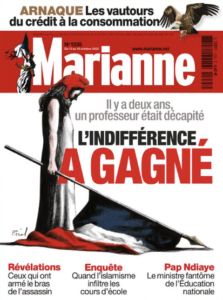Rien n’a changé. That was the theme among French political papers over the weekend, two years on from the daylight decapitation of schoolteacher Samuel Paty.

Marianne, the Left-wing weekly named after the personification of the French Revolution, declared on its front page: ‘Indifference has won’. Franc-Tireur, a universalist magazine which tackles opponents as varied as the far-Right, Islamism and ‘wokeness’, ran with ‘Fear in the School: Fundamentalism Still Threatens the Institutions’. On the centre-Right the mood was similar; Le Figaro, France’s oldest newspaper, used a near-identical headline and an editorial: ‘The Shame’.
The reasons for the gloom were underlined just days before the anniversary. Last week, a schoolteacher was forced into police protection after receiving death threats and anti-Semitic abuse in a letter promising the same fate as Paty. Another teacher was threatened by the relative of a pupil for merely discussing the Charlie Hebdo cartoons in class.
Far from being deterred by the knowledge of Paty’s fate, campaigns and threats against educators have continued unabated in the two years since, and in some cases have crossed the Channel.
There’s a sense that schoolteachers are on the frontlines in the defence of republican principles, which is under assault from the religious Right (Catholic or Islamist) and the identity-obsessed Left. But it is France’s Islamist scene that clearly sees the classroom as a frontline. A confidential government report recently sounded the alarm that Islamist ‘influencers’ have been waging an online offensive to destabilise institutions and undermine laïcité (secularism) in the school. Large accounts on mainstream social media platforms encourage young people to confront staff on matters of religious contention, to pressure other students, and to deliberately violate school rules on dress code and religious attire.
The narrative from Islamist influencers on the ground and online is that laïcité is really a thin façade for state persecution of Islam — a message which has also found a receptive audience among some Anglophone liberals. But the religion that increasing numbers of students are agitating to practice is not necessarily the religion of their parents or grandparents. Instead, it is one which reflects a normalisation of ultra-conservative Salafism as the default in certain neighbourhoods and on social media.
Laïcité’s defenders posit that it is not persecution but emancipation, ensuring every individual is free from communal pressures and able to enjoy full access to their rights as a French citizen. None of this is about counter-terrorism, but rather making sure that republican ideals are passed to the next generations, a task which, in our digitally connected world, is under extraordinary pressure from outside challengers and the Islamists’ veto.
The prospect of civil conflict in France seems far-fetched, but it nevertheless seems to haunt some imaginations, from filmmakers to retired generals. It is also a stated objective of jihadists. In order to reverse this pessimism, much rests on the shoulders of schoolteachers, even if this was not what they signed up for. Two years on from the horrific murder of one of their colleagues, they will need all the support they can get.










Join the discussion
Join like minded readers that support our journalism by becoming a paid subscriber
To join the discussion in the comments, become a paid subscriber.
Join like minded readers that support our journalism, read unlimited articles and enjoy other subscriber-only benefits.
Subscribe